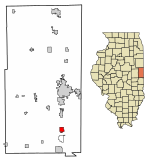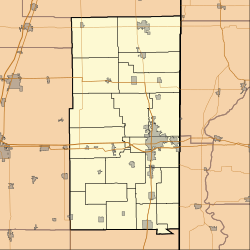Georgetown, Illinois
Georgetown, Illinois | |
|---|---|
City | |
 | |
 Location of Georgetown in Vermilion County, Illinois. | |
| Coordinates: 39°58′43″N 87°38′10″W / 39.97861°N 87.63611°W | |
| Country | United States |
| State | Illinois |
| County | Vermilion County |
| Township | Georgetown Township |
| Founded | 1826 |
| Area | |
• Total | 1.61 sq mi (4.18 km2) |
| • Land | 1.61 sq mi (4.18 km2) |
| • Water | 0.00 sq mi (0.00 km2) 0% |
| Elevation | 669 ft (204 m) |
| Population | |
• Total | 3,474 |
• Estimate (2016)[4] | 3,312 |
| • Density | 2,052.04/sq mi (792.51/km2) |
| Time zone | UTC-6 (CST) |
| • Summer (DST) | UTC-5 (CDT) |
| ZIP code | 61846 |
| Area code | 217 |
| FIPS code | 17-28963 |
| Website | GeorgetownIL.com |
Georgetown is a city in Vermilion County, Illinois, United States. As of the 2010 census, the city population was 3,474.[3] It is part of the Danville, Illinois Metropolitan Statistical Area.
History

Georgetown was established in 1826 and was platted by James Haworth, although the first home was established in 1820 by Henry Johnson. The town may have been named after George Beckwith, since Danville had been named after Dan Beckwith; another possibility is that it was named after James Haworth's son George.[5] The first post office was established in 1828.[6]
The Paris and Danville Railroad was built in 1871, and the "Interurban" started carrying passengers between Georgetown and Danville sometime after 1900.[5]
Geography
Georgetown is located on Illinois Route 1 / U.S. Route 150 about 13 miles (21 km) south of the county seat of Danville. According to the 2010 census, Georgetown has a total area of 0.14 square miles (0.36 km2), all land.[7]
Demographics
| Census | Pop. | Note | %± |
|---|---|---|---|
| 1880 | 741 | — | |
| 1890 | 662 | −10.7% | |
| 1900 | 988 | 49.2% | |
| 1910 | 2,307 | 133.5% | |
| 1920 | 3,061 | 32.7% | |
| 1930 | 3,407 | 11.3% | |
| 1940 | 3,235 | −5.0% | |
| 1950 | 3,294 | 1.8% | |
| 1960 | 3,544 | 7.6% | |
| 1970 | 3,984 | 12.4% | |
| 1980 | 4,220 | 5.9% | |
| 1990 | 3,678 | −12.8% | |
| 2000 | 3,628 | −1.4% | |
| 2010 | 3,474 | −4.2% | |
| 2016 (est.) | 3,312 | [4] | −4.7% |
| U.S. Decennial Census | |||
As of the census[8] of 2000, there were 3,628 people, 1,470 households, and 1,004 families residing in the city. The population density was 2,250.6 people per square mile (870.0/km²). There were 1,564 housing units at an average density of 970.2 per square mile (375.1/km²). The racial makeup of the city was 95.53% White, 2.73% African American, 0.28% Native American, 0.06% Asian, 0.25% from other races, and 1.16% from two or more races. Hispanic or Latino of any race were 1.19% of the population.
There were 1,470 households out of which 34.4% had children under the age of 18 living with them, 49.9% were married couples living together, 14.2% had a female householder with no husband present, and 31.7% were non-families. 28.6% of all households were made up of individuals and 16.2% had someone living alone who was 65 years of age or older. The average household size was 2.47 and the average family size was 3.00.
In the city, the population was spread out with 27.9% under the age of 18, 8.2% from 18 to 24, 26.7% from 25 to 44, 21.1% from 45 to 64, and 16.0% who were 65 years of age or older. The median age was 36 years. For every 100 females, there were 90.1 males. For every 100 females age 18 and over, there were 83.1 males.
The median income for a household in the city was $33,852, and the median income for a family was $37,310. Males had a median income of $32,974 versus $22,581 for females. The per capita income for the city was $14,275. About 8.8% of families and 13.9% of the population were below the poverty line, including 21.6% of those under age 18 and 7.2% of those age 65 or over.
Education
- Georgetown Ridge Farm, High School located in Georgetown.
- Mary Miller Junior High, located in Georgetown.
- Pine Crest Elementary, located in Georgetown.
- Notre Dame de la Salette Boys Academy, traditionalist Catholic school administered by the Society of Saint Pius X.
References
- ^ "2016 U.S. Gazetteer Files". United States Census Bureau. Retrieved Jun 29, 2017.
- ^ "USGS detail on Georgetown". Retrieved 2007-09-16.
- ^ a b "2010 City Population and Housing Occupancy Status". U.S. Census Bureau. Archived from the original on July 21, 2011. Retrieved May 14, 2012.
{{cite web}}: Unknown parameter|deadurl=ignored (|url-status=suggested) (help) - ^ a b "Population and Housing Unit Estimates". Retrieved June 9, 2017.
- ^ a b Stapp, Katherine; W. I. Bowman (1968). History Under Our Feet: The Story of Vermilion County, Illinois. Danville, Illinois: Interstate Printers and Publishers, Inc. pp. 22–24.
- ^ Jones, Lottie E. (1911). History of Vermilion County, Illinois (volume 1). Chicago, Illinois: Pioneer Publishing Company. p. 95.
- ^ "G001 - Geographic Identifiers - 2010 Census Summary File 1". United States Census Bureau. Retrieved 2015-12-27.
- ^ "American FactFinder". United States Census Bureau. Archived from the original on 2013-09-11. Retrieved 2008-01-31.
{{cite web}}: Unknown parameter|deadurl=ignored (|url-status=suggested) (help)


